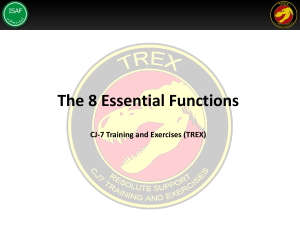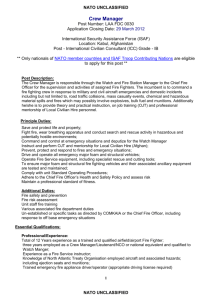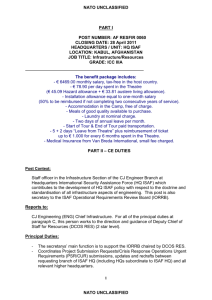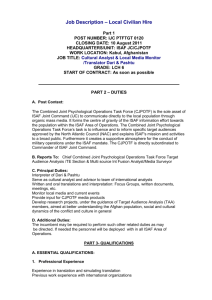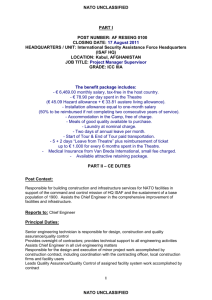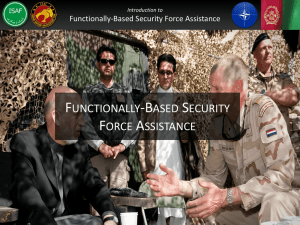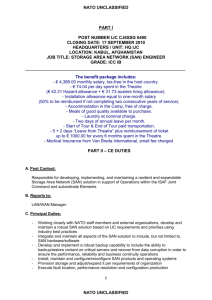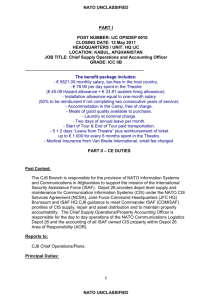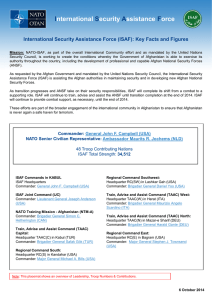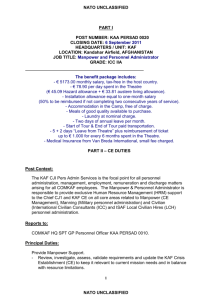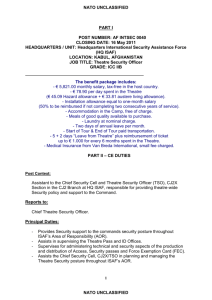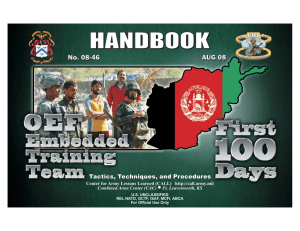Lesson_4_Essential_Functions_NIU
advertisement
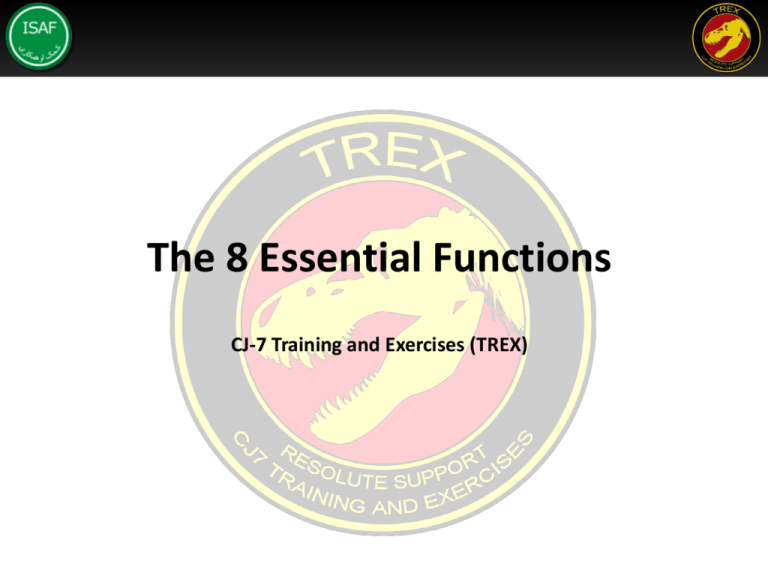
The 8 Essential Functions CJ-7 Training and Exercises (TREX) Content 1. The 8 EF’s (know what are they and why were they developed) 2. Alignment EF’s with ASI/ANSF (know it is not an isolated CF-system) 3. Process Maps (know what they look like) Background • Security Force Assistance (SFA) matured from 5 Functional Pillars (FPs) to 8 Essential Functions (EFs); • 5 Pillars too tactically focused (fight the war) • 8 Essential Functions necessary to (sustain the ANSF) – – – – – – EFs integrate advisors @ ministerial, institutional, & fielded force levels Achieve ASI/ANSF sustainability Focus GIRoA/CF problem-solving Maintain IC support Enable ASI/ANSF to fight insurgency Enable withdrawal of CF 3 CONCEPT OF OPS • The 8 EFs are Afghan system focus areas. These functions are interdependent and, taken as a whole, contribute to Afghan sustainability. They span across all levels of conflict, from the tactical to the strategic. • Each Essential Function consists of Afghan systems, processes, and organizations necessary to implement the function. These systems, processes, and organizations have friction points, which prevent efficient flow of information and resources. • Advisors focus on influencing these processes; however advisors should not directly impact the process. Afghan sustainability must evolve in a way that allows for enduring progress. From 5 Pillars to 8 Essential Functions EF 1 PPBE EF 4 Force Gen EF 5 Sustainment EF 6 ESC EF 2 TAO EF 7 Intelligence EF 3 CivGov/RoL Sustainment Training CAI / ILS Leadership C2 EF 8 StratComm The processes found in the 5 Functional Pillars were re-assigned to the 8 Essential Functions 5 NATO/ISAF UNCLASSIFIED The 8 Essential Functions The 8 Essential Functions provide the framework and desired outcomes in target areas to achieve Afghan sustainability. Each EF contains a series of Afghan processes with tactical, operational, and strategic characteristics, all of which may have interactions across other EFs. This multi-echelon level of advising and cross-functional coordination allows analysis of Afghan process issues through multiple lenses. 6 NATO/ISAF UNCLASSIFIED Essential Functions 1 - 4 Plan, Program, Budget and Execute; generate requirements, develop a resource informed budget and execute a spend plan. (PPBE) IC SUPPORT Internal controls to assure Transparency, Accountability, and Oversight. (TAO) Civilian governance of the ASI, including adherence to the Rule of Law. (ROL) Force Generate; recruit, train, retain, manage and develop a professional ANSF. (FORGEN) 7 NATO/ISAF UNCLASSIFIED Essential Functions 5 - 8 FACILITATE AIM Sustain the force through effective facilities management, maintenance, medical, and logistics systems. (SUSTAIN) Plan, resource and execute effective security campaigns and operations. (ESC) Sufficient Intelligence capabilities and processes. (INTEL) ENABLE Maintain internal and external Strategic Communication capabilities. (STRAT COMM) 8 NATO/ISAF UNCLASSIFIED 2. Alignment with ASI/ANSF priorities NATO/ISAF UNCLASSIFIED 2. EF alignment with MOD / MOI MINDEF Priorities 1. Win the current fight Essential Function Priorities 2. Long-term sustainment of the Force ESSENTIAL FUNCTION 2 – Transparency, Accountability, and Oversight 1 ISAF identify ASI/ANSF individual(s) responsible for TAO, individuals responsible for development and/or compliance with internal controls, oversight organizations and their authorities; Ministers review/approve/advocate for current or new authorizations for oversight organizations 3. Facilitate a peaceful political transition 2 MoI/MoD establish an empowered Ministerial Internal Controls Program (MICP). Focus on unit readiness, effectiveness, review of controls. Reports inform IC for Chicago/TMAF/Commitment Letter compliance 4. Close the capability Gaps 5. Develop border security strategy 6. Develop leaders / Educate the force 7. Implement viable counter-corruption program 8. Strengthen institutional capacity 9. Individual and collective training at the unit level 10. Budget Development and Execution MININT Priorities 1. Post Election Security 2. Highway & Convoy Security 3. Provincial Security 3 ASI/ANSF leaders conduct a review of critical financial & non-financial processes, assess current controls; Implement a plan to strengthen or establish new controls 4. Budget Execution & Development ESSENTIAL FUNCTION 3 – Rule of Law 5. Ministerial / Political Transition 1 Monitor, report, investigate and adjudicate allegations of GVHR and EJV/EJK; internal disciplinary matters 2 Use of ANSF internal disciplinary procedures to investigate and adjudicate violations 3 Encourage institutionalization and effectuation of professionalization training (including on new laws), to facilitate coordination and communication between ANSF and Rule of Law actors, and to establish effective and transparent criminal and disciplinary systems. ESSENTIAL FUNCTION 4 – Force generate, recruit, train, retain, manage, and develop a professional ANSF 1 Support ANA clarification of the roles, C2, structure, resourcing (including training gap analysis) and relationship of Corps Training Kandaks and Branch Schools. 2 TED COMD established/define roles/ responsibilities of training & education enterprise leadership 3 Strengthen TGC C2 over ANP training enterprise 4 Educate ANA about strategic management capability of AHRIMS & build confidence in automated personnel processes ESSENTIAL FUNCTION 8 - STRATCOM 1. Sustain Security News Desk capability 2. Sustain School of Public Affairs 3. Sustain AIDO capability 4. Train ANA leaders on IO capabilities 5. Sustain GMIC capacity 6. Fight against Corruption 7. Logistics and Sustainment 8. Inter-ministerial Security Coordination 9. International Standards 10. Professionalization of MoI 2. PRIORITIES FOR MoI/MoD Example as of : 12 Aug 2014 MoI as at 12 Aug 14 MoD as at 17 Jul 14 Priority CoGS Priorities OPR OPR 1. Close Win the current fight – defeat the insurgency EF 6 2. Deep Long-term sustainment of the force EF 5 3. Deep Facilitate a peaceful political transition EF 3 4. Close Close the capability gaps EF 4/6 5. Close Develop border security strategy EF 6 6. Deep Develop leaders / educate the force EF 4 7. Deep Implement viable counter-corruption program EF 2/3 8. Deep Strengthen institutional capacity N/A 9. Close Priorities MINDEF Priorities Priorities Individual and collective training at the unit level CoGS Priorities EF 4 OPR 1. Close Sustained security operations EF 6 4. Deep Base transition and security EF 5 2. Close ANA support to movement of election materials EF 6 5. Close Addressing capability gaps EF 4,6 3. Close Inauguration Security EF 6 6. Close Sustaining current capabilities – logistics, maintenance, supply EF 5 NATO/ISAF UNCLASSIFIED 3. Process Maps Maybe western visualization of Afghan processes but: - Are being made by former advisors ICCW Afghan counterparts - Visualize extensive advisor efforts - Are the best tool available to investigate and solve problems - Are the means to minimize patronage/regional influence on Afghan systems - Are essential for nation building - Are essential to achieve sustaining ANSF ANNEX B in Guide! NATO/ISAF UNCLASSIFIED EF 4 Force Generation NATO/ISAF UNCLASSIFIED B 15 Process Map EF 5 Force Sustainment NATO/ISAF UNCLASSIFIED B 19 Process Map References Terms of Reference for Operationalizing Functionally-Based Security Force Assistance http://portal.hq.ms.isaf.nato.int/DCOSOPS/CJ3/CJ%2035/SFAFUSION/default.aspx Operationalization of Functionally Based Security Force Assistance Handbook v 1.1 http://workspace.hq.ms.isaf.nato.int/IHQ/DCOSOPS/CJ3/SFA_Fusion_Cell/Documents/ISAF/08_SF A_Key_Documents/Operationalization_of_FB_SFA_Handbook_Version_1.1.pdf FRAGO 1001-2014 Operationalization of FB-SFA http://workspace.hq.ms.isaf.nato.int/IHQ/RecordsCentre/Documents/2014/20140607-NIU-IHQFRAGO-1001-2014_Operationalizing_FB-SFA.pdf RS Security Force Assistance Guide 3.0 http://workspace.hq.ms.isaf.nato.int/IHQMM/CGHQ/CAAT/Documents/BiSC/FBSFA%20Rollout%20-%20Jul2014/2014.07.02.SFA%203.0%20Final%20v2.pdf SFA Centre Portal http://portal.hq.ms.isaf.nato.int/DCOSOPS/CJ%2035/SFAFUSION/default.aspx SFA Collaboration Site http://portal.hq.ms.isaf.nato.int/CGHQ/CAAT/SFA_Collaboration_Site/default.aspx CAAT Portal http://portal.hq.ms.isaf.nato.int/CGHQ/CAAT/default.aspx NATO/ISAF UNCLASSIFIED
